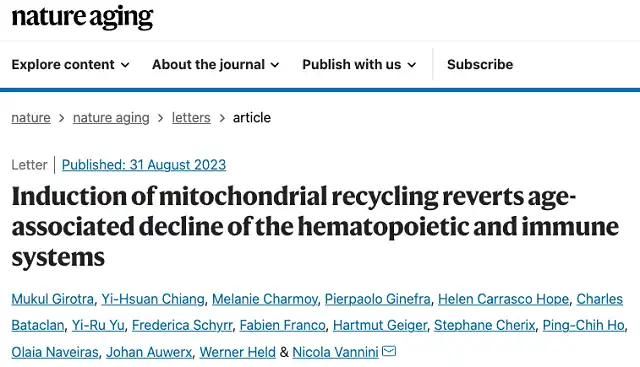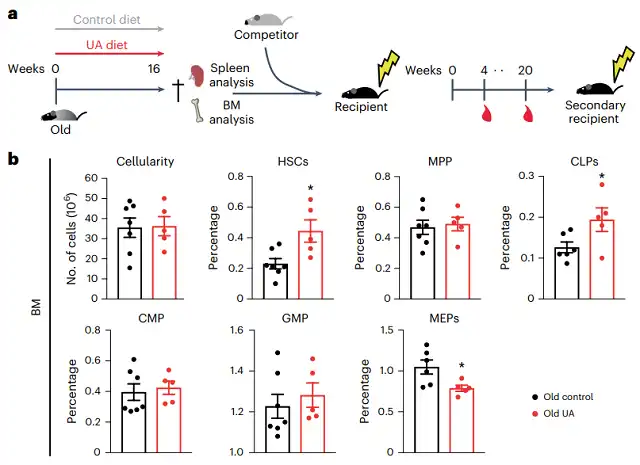Pomegranates Reverses Aging of Hematopoietic Stem Cells and Immune System
- Normal Liver Cells Found to Promote Cancer Metastasis to the Liver
- Nearly 80% Complete Remission: Breakthrough in ADC Anti-Tumor Treatment
- Vaccination Against Common Diseases May Prevent Dementia!
- New Alzheimer’s Disease (AD) Diagnosis and Staging Criteria
- Breakthrough in Alzheimer’s Disease: New Nasal Spray Halts Cognitive Decline by Targeting Toxic Protein
- Can the Tap Water at the Paris Olympics be Drunk Directly?
Pomegranates Reverses Aging of Hematopoietic Stem Cells and Immune System
- Should China be held legally responsible for the US’s $18 trillion COVID losses?
- CT Radiation Exposure Linked to Blood Cancer in Children and Adolescents
- FDA has mandated a top-level black box warning for all marketed CAR-T therapies
- Can people with high blood pressure eat peanuts?
- What is the difference between dopamine and dobutamine?
- How long can the patient live after heart stent surgery?
Nature Aging: Eating More Fruits like Pomegranates Reverses Aging of Hematopoietic Stem Cells and Immune System.
Aging is a complex, multi-stage, and gradual process that occurs throughout the lifespan. With advancing age, the human body’s organs, hematopoietic stem cells (HSCs), and immune system gradually age, leading to the development of age-related diseases such as infections, cancer, and cardiovascular disorders.
Hematopoietic stem cells (HSCs) are a class of cells with self-renewal capacity and multipotent differentiation potential, playing a crucial role in maintaining a healthy immune system. As individuals age, the regenerative capacity of HSCs declines, and they exhibit a preference for specific cell lineages, resulting in impaired immune system function.
Recently, researchers from the University of Lausanne in Switzerland published a study titled “Induction of mitochondrial recycling reverts age-associated decline of the hematopoietic and immune systems” in the journal Nature Aging [1].
The study reveals that the abnormal accumulation of mitochondria in hematopoietic stem cells is a contributing factor to their aging, and supplementing with a mitochondrial regulator called Urolithin A (UA) can modulate mitochondrial function within these stem cells, restoring the blood regeneration capacity of “aged” hematopoietic stem cells.
Additionally, supplementing with Urolithin A can also restore lymphocytes, enhance the function of hematopoietic stem cells (HSCs), and improve the immune response to viral infections in aged mice. This research holds promise for potential solutions with far-reaching impacts on the elderly population.

Urolithin A (UA) is a compound produced through the metabolism of foods rich in tannins, such as pomegranates and raspberries, by gut bacteria. Previous studies have shown that Urolithin A can activate mitochondrial autophagy, improving mitochondrial health.
In this study, researchers fed mice (18 months old) a diet rich in Urolithin A for four months, monitoring changes in blood cell composition every month. They characterized hematopoietic stem cells and progenitor cell pools and analyzed the immune system.
Analysis of bone marrow hematopoietic stem cells and progenitor cells revealed an increase in hematopoietic stem cells and lymphoid progenitor cell levels, while erythroid progenitor cell levels decreased, with no changes observed in other cell types. Notably, during the aging process, lymphoid progenitor cells tend to decrease, while erythroid progenitor cell content increases. This suggests that a Urolithin A-rich diet can restore characteristics of the aging hematopoietic system.

Researchers also tested the marrow function of mice supplemented with Urolithin A by transplanting their marrow into lethally irradiated mice. Compared to the control group, the mice transplanted with Urolithin A-supplemented marrow exhibited higher hematopoietic capacity. This indicates that Urolithin A supplementation can restore the blood regeneration capacity of “aged” hematopoietic stem cells.
Furthermore, researchers examined whether enhanced hematopoietic capacity would improve immune function. They infected aged mice supplemented with Urolithin A with lymphocytic choriomeningitis virus for eight weeks and found that Urolithin A-supplemented aged mice displayed better virus control capabilities. The results also indicated that the improved immune function in Urolithin A-driven aged mice could be directly attributed to the restoration of HSC function.

Lastly, researchers discovered that Urolithin A operates through mitochondrial recycling to rebuild mitochondrial function and health.

In summary, this study suggests that a diet rich in Urolithin A can not only restore the blood regeneration capacity of aged hematopoietic stem cells but also improve the immune system function in aged mice. Essentially, Urolithin A operates through mitochondrial recycling. This research offers hope for addressing age-related health conditions and paves the way for clinical trials.
In October 2022, researchers from the University Hospital Frankfurt in Germany published a study titled “Expansion of T memory stem cells with superior anti-tumor immunity by Urolithin A-induced mitophagy” in the top immunology journal, Immunity [2].
This study demonstrates that Urolithin A, a metabolite of foods like pomegranates in the gut microbiota, can promote the expansion of T memory stem cells (Tscm) by activating mitochondrial autophagy. This provides the immune system with rejuvenated and non-exhausted T cells, effectively suppressing cancer growth by directly regulating the immune system.

References:
1. https://www.nature.com/articles/s43587-023-00473-3
2. https://doi.org/10.1016/j.immuni.2022.09.014
Pomegranates Reverses Aging of Hematopoietic Stem Cells and Immune System
(source:internet, reference only)
Disclaimer of medicaltrend.org
Important Note: The information provided is for informational purposes only and should not be considered as medical advice.



